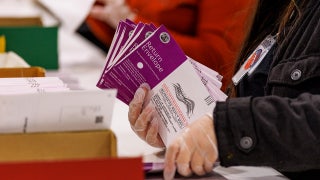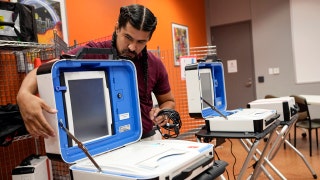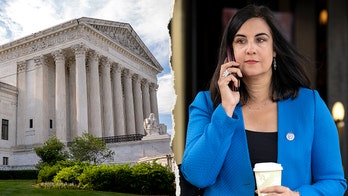Fox News Flash top headlines for May 13
Fox News Flash top headlines are here. Check out what's clicking on Foxnews.com.
Get the latest news on coronavirus and more delivered daily to your inbox. Sign up here.
House Democrats again will try to pass a temporary proxy voting proposal Friday after pulling the plan last month amid GOP objections.
Despite bipartisan talks since then, House Majority Leader Steny Hoyer, D-Md., said they couldn't reach a deal. The proxy plan will get a vote on the same day the House returns to take up a newly unveiled $3 trillion coronavirus relief bill.
"While we could not come to an agreement, we have incorporated several Republican ideas into this resolution," Hoyer said in a statement Wednesday with Reps. Zoe Lofgren, D-Calif., and James McGovern, D-Mass.
"We will now move forward on these temporary emergency procedures to ensure the House can continue fully working for the people during this public health and economic emergency. The time has come to act – further delay is not an option.”
HOUSE DEMS UNVEIL CORONAVIRUS BILL ESTIMATED TO COST $3T, IN LARGEST STIMULUS PACKAGE YET
The latest House proposal allows for proxy voting on the House floor and for remote committee hearings for 45 days and could be renewed or modified for the remainder of this congressional term.
When a vote is called, members who are not in Washington will determine whom they will “phone in” their vote to on the floor to cast a ballot on behalf of the absent members.
No member can be responsible for casting the ballots of more than 10 proxies. That means, with a current House population of 430 members, there must be at least 43 members on the floor to cast ballots on behalf of their colleagues.
When deciding to cast a vote by proxy, members must submit a letter to the Clerk of the House, Cheryl Johnson. Members are given at least a day’s notice before voting on the final passage on any measure.
DEMOCRATS' $3T CORONAVIRUS RELIEF BILL EXTENDS STIMULUS CHECKS TO CERTAIN UNDOCUMENTED IMMIGRANTS
In a letter to colleagues outlining the proposal, House Rules Committee Chairman Rep. James McGovern called the coronavirus crisis an "extraordinary time."
"In normal times, we work best when we work together, face-to-face, and side-by-side; however, this is an extraordinary time and we must adapt, just as past Congresses have done before us," McGovern wrote. "No one knows what the future will bring, but our ability to continue legislating must remain beyond question."
But Republicans are deeply skeptical of proxy voting and view the temporary move as a way to centralize power. Rep. Kevin Brady, R-Texas, said he'd be voting "no" Friday on the plan.
Brady said Democrats abused proxy voting power when it was permitted in House committees and he praised the GOP for banning the practice in 1995 at the committee level, when Republicans won back control of the House.
"I believe it's a mistake for Democrats to try to restore shadow voting, or proxy voting," said Brady, who said the process turned into members having to "surrender" their vote to the committee leaders.
TOP GOP REP BLASTS DEMOCRATS' $3T BILL AS 'RECIPE FOR A PROLONGED RECESSION'
House Minority Leader Kevin McCarthy, R-Calif, and Reps. Tom Cole, R-Okla., and Rodney Davis, R-Ill., blasted the Democrats’ partisan proposal as the biggest power grab in the history of Congress.
"It creates a dangerous new definition of 'voting by proxy' that runs counter to past House committee precedent, current Senate committee practice, and the Constitution," the three lawmakers said in a statement.
"It facilitates only legislative theater while enabling the most significant power grab in the history of Congress, leaving our constituents’ voices shut out of the real lawmaking process."
House Republicans have put forth their own plan on how to safely reopen Congress that maintains in-person voting for all members but doing so with social distancing in mind.














































